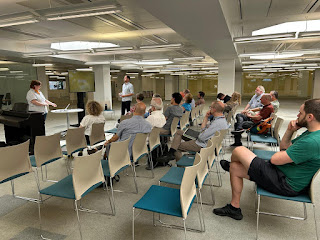Manoj Singh, Senior Digital Education Consultant at Birkbeck, shares his experiences of taking part in the BLE's 'Great Minds' buddy exchange. Any BLE staff members interested in meeting colleagues working on similar projects, activities or towards common goals should get in touch with us here and we will happily arrange a session.
As a relatively new member of staff at Birkbeck, one of the valuable experiences I've had has been participating in the recent cross-institutional networking led by Sarah Sherman and Julian Bream from BLE. Through sensibly arranged introductory meetings, I've had the opportunity to connect with colleagues from City St George's and SOAS, exploring shared interests in project management and learning analytics respectively.
What made these sessions particularly meaningful for me was discovering
how much we have in common. Despite working at different institutions, we're
often dealing with similar challenges, implementing comparable systems, and
working toward parallel goals. It's reassuring to realise that you're not alone
in facing obstacles, and even more valuable is learning how others have
approached (and in most cases resolved) similar issues.
For someone who values networking and knowledge sharing and who is still
finding their feet in a new role, these connections have been very helpful. The
meetings provided not just practical insights but also a wider perspective on
how our work at Birkbeck fits within the broader landscape of higher education
and particularly within the BLE. Hearing how colleagues at City St George's
approach project management, or learning about SOAS's practices in learning
analytics, has given me perspective and helped me understand my own work
better.
A similar type of collaboration, which was also organised by the BLE, had proven essential in the past for me in a prevuios role (and to others involved). This was when a system we all used was suddenly decommissioned with little time to find a replacement. Working together across institutions was vital in overcoming this challenge. That’s why I think this new scheme lays the groundwork for establishing ongoing collaboration on a wider scale. Rather than each institution working alone and potentially repeating the same mistakes, we have ways to share knowledge, compare approaches, and learn from each other.
The value of these connections goes far beyond the initial meetings: they represent the beginning of a community of practice that will prove beneficial for years to come. Finally, this exchange of ideas can only strengthen our practice and benefit our institutions, and I hope this scheme continues and expands.



